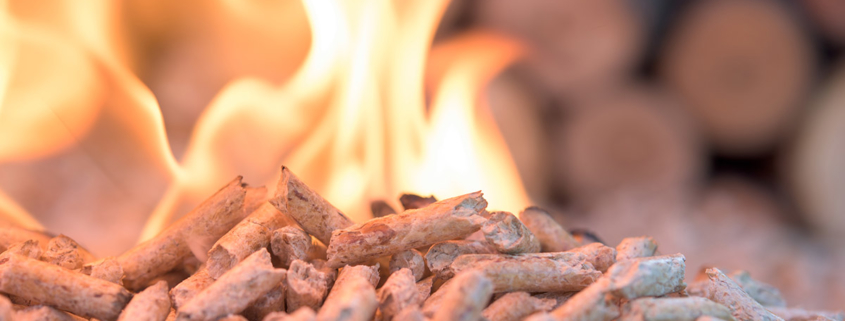Biomass Energy – The facts.
You’d be surprised just how far back our biomass history stretches. It’s believed that our ancestors first started cooking meat over an open fire as far back as two and a half million years ago. And here we are, all those years later, still relying on biomass energy to cook our food and heat our homes.
But what exactly is biomass energy? Well, simply put, biomass energy is the energy that we’ve derived or produced from living organisms, such as plants or animals. The most common biomass materials are plants, waste, and wood. These are called biomass feedstocks.
Biomass can be burned by thermal conversion and used as energy. Burning these feedstocks dehydrates and stabilises them. The most common of these raw materials are municipal solid waste (MSW) and lumber.
To some this might not sound overly stimulating but remember this: the renewable energy from biomass will make a significant contribution to the UK’s heat and energy requirements as the decade unfolds. In Dec 2020 the UK Government committed to reduce the UK’s emissions by at least 68% by 2030, compared to 1990 levels.
So, for anyone without encyclopaedic knowledge of biomass or who just wants to learn more, here are seven things that you probably don’t know… and one you do.
Waste Is No Longer Waste
Biomass energy is essentially energy that’s created from any organic, renewable material – what may of us consider waste. Now, this can be anything from crops to wood, food waste to pellets, logs to manure… the list goes on.
What does this mean? We can drastically reduce our reliance on fossil fuels, like coal, oil, and natural gas. Better still, in burning waste, it’s no longer waste!
The Skies the Limit!
There is a potentially bottomless supply of biomass fuel. The abundance of our waste residue, be it harmful or not, has been one of the most talked about political, economic, and environmental issues since the industrial revolution.
Now, waste will always exist to some degree. But, be reducing the amount of waste we create, we will create a better world for our lives and the lives of our children’s children.
It Won’t Put Anyone Out of Pocket
The cost of creating biomass energy is significantly cheaper than non-sustainable energy sources – and some renewable energy sources too! Then there’s the infrastructure which again is very cost-effective.
So, in effect, by investing in biomass energy, we can enjoy sustainable, cost-effective energy for generations to come.
You Won’t Have to Worry About Carbon Emissions
Anyone who pays attention to the world around us knows our carbon emissions is a hotbed topic wherever you live. Now, here’s something that you may not know: the UK government are committed to reducing carbon emissions and have strict targets that they are determined to meet.
In burning coal, you add carbon dioxide to the atmosphere. But, did you know that once you add carbon dioxide to the atmosphere its stays there for anywhere between 300 to 1000 years!
Biomass fuels presents an alternative to this – one that doesn’t have anywhere near the lasting effects as burning carbon does.
There Are Notable Socio-Economic Benefits
Given that biomass can be produced anywhere in the UK, which means that it’ll have more production networks. This can enrich multiple areas of the UK which will see small and large regions prosper.
Recent times have also seen an investment in using biomass fuel from sustainable sources only. This is not only great for the environment, but farmers and rural landowners too who’ll be able to take advantage of more opportunities and enjoy more revenue.
The UK…And the World Is Taking Notice
You don’t have to look far to see the UK’s commitment to biomass fuels. Earlier this month Prime Minister, Boris Johnson, said that nations should ‘go further’ to protect the natural world, reduce carbon emissions in his address to world leaders at the UN-backed One Planet Summit.
His message did not go unheeded. It has long been on the agenda for nations across the world. Biofuel production is predicted to increase 25% globally over the next five years. China, Brazil, and the USA are leading the way with India, Germany, and the UK not far behind.
If the UK is to meet its ambition of achieving net zero emissions by the year 2050, this emphasis on biomass fuels needs to continue.
Biomass Encourages a Reduction in Landfills
It’s estimated that across the UK there are more than 500 landfills. Long being a bone of contention for environmentalists, landfills have rampant amounts of toxic waste, rich in greenhouse gases and produce leachate (the toxic liquid found at landfills of varying consistencies.)
By reducing or reliance on disposing of waste in landfills and switching to more sustainable solutions, we can improve the environment and stave off any long-term environmental issues.
What You Might Not Know – Biomass Is a Strong Aspect of a Wealth of Countries’ Commitment to Sustainability
Forest biomass has long been promoted as a cleaner and more renewable energy alternative to oil and gas, but only if younger, sustainable trees are burned. Why? When burned, older trees release large amounts of carbon dioxide into the atmosphere – and it can take years to replenish the area.
Now, the key wording in the above paragraph is ‘younger, sustainable trees.’
Responsibly using biomass is already a large part of progressive countries environmental agendas. Denmark is committed to making its capital, Copenhagen, the world’s first carbon-neutral city by the year 2025.
Now, a large part of Denmark’s ambition is being driven by its enhancements in onshore and offshore wind power, but that aside the fact that Denmark has made this commitment is evidenced of the country’s seriousness in promoting carbon neutrality.
Biomass Energy Offers a Wide-Ranging Solution
Though not without its flaws, biomass energy offers an alternative to our continued reliance on harmful fossil fuels. Such is its potential it should come as little surprise that the UK and countries across Europe are increasingly adopting it.
Even now, millions of years later, our use of biomass fuels is still prevalent.
If you have a wood burning stove or outdoor wood burner and want to buy premium logs with optimal moisture concentrations, contact us today https://firewoodforstoves.com .





Leave a Reply
Want to join the discussion?Feel free to contribute!